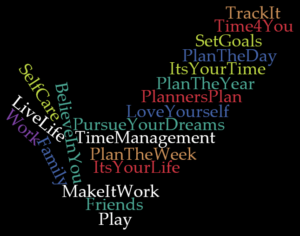I’m a planner. I always have been, but that doesn’t mean my time doesn’t get away from me. I’ll freely admit I struggle with saying no, setting both time and personal boundaries, but that’s what makes doing so incredibly important for me.
Knowing how many other people struggle with setting goals, much less achieving them, I thought I’d share some of the things I’ve learned over the years that help me do just that. They’ll be author focused, but honestly these techniques have been useful to me as volunteer, a parent, a wife, as well as while going to school and working multiple jobs simultaneously.
1. Identify one overriding goal for the month, quarter or year (depending on how your mind and motivations work). Make that goal measurable, attainable and with a time limit. (I prefer to set a career goal and a personal goal to help me do what comes next.)
My career goal this year: to rebuild my career. (The measure of that goal is manifold but primarily revolves around both seeing NEW books get published and my rankings rise once again on Amazon, Nielson Bookscan list, search engines, etc.)
My personal goal is to continue to improve my physical and mental health. (Again I can measure this in a variety of ways. Weight loss, blood sugars, vitality as well as mental acuity and sense of overall well-being – which I realize is something only I can measure but that does not make it any less valid for me.)
2. Make a list of very specific goals that will help attain the main goal. Again, remember, measurable, attainable and with a time limit. In this, I set hard and soft goals for myself. I want to write seven books this year, but understand that life rarely goes according to plan, so while 4 of those books are hard goals, 3 are soft. This only works because I am no longer under contract to multiple publishers and plan to self-publish at least one of these books.
Note: I discovered that when I felt relief rather than regret upon being told by my agent that my single title publisher wanted to cancel my contract because I was so abysmally late with my books – having so many contracted books was sucking out my creative soul. I made mistakes, but I’m trying now to focus on my love and passion for my writing and letting my career rebuild on top of that, not frenetic work. I also set weekly goals based on my overall goal list, allowing me to drill down to what is important for me to do right now, without getting bogged down by everything I hope to accomplish.
In my personal life, I have an entire routine of self-care, healthy choices I’m tracking weekly in my planner along with weekly goals toward those things that is making my overall goal of continuing to improve my physical and mental well being an attainable goal.
We enjoy the meal of our life most when we eat it in small, savored bites.
3. I use a planner because my phone simply cannot track all my scattered thoughts and competing energies for my time. Besides, I love the time I get to spend being creative with it, which incidentally is part of my self-care. 🙂 But you do you, just make sure you have someplace that you are tracking your goals, your to do list and calendar. My niece does a weekly spread on the wall, so she and her husband can track what’s happening/needs to happen together. My friend keeps everything in his phone. Whatever way you track your life, make it something you can and will refer to on a daily basis.
4. Create a daily schedule for an *overall* outline of how your time gets spent. This one is important, but I spent years fighting against having my time scheduled to the hour. Here’s the thing, until I wrote down all the stuff I did in the mornings and all the stuff I was supposed to do, I couldn’t figure out why different elements to my day always had to be stepped over. One day I could work out light therapy and the next my walk, but not both. Creating my daily schedule made me see how much time I needed to do what needed doing. My schedule allows for spontaneity and shifting elements, but having it makes me aware of the consequence of certain time choices.
Note: if getting everything done in a day requires us not getting adequate sleep, and no time to unwind and just be, then we need to change everything we *can* about what has to go into that schedule. Making life work in the now but losing ourselves in the long run isn’t an option I recommend for anyone.
5. Identify where you are feeling the most stressed and start setting some boundaries. You don’t have to verbalize them to everyone else. Just stop saying yes, or offering up your time when you now realize (because you took time to think about this for longer than the minute it took to read this paragraph) that doing so is going to impinge on your own life’s balance. This doesn’t mean saying no all the time, or never offering to help others. I would hate a life like that, but it does mean you’ll have more patience and energy for the times you really need it because you kept something in reserve.
Let’s start the New Year gifting ourselves with time to live, to pursue our dreams and stop chasing our calendars until they bury us!
Happy 2018!


